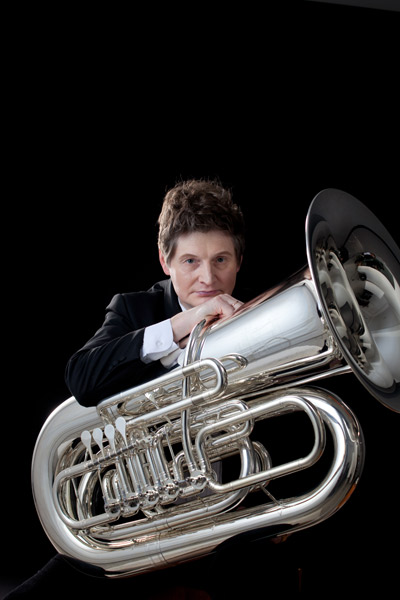 |
|
Russian tuba player Alexander Filippov. [Photo provided to China Daily] |
By and large, Shanghai Symphony Orchestra's musicians are younger than those in similar orchestras in the United States, he says, giving it more flexibility that accounts for the speed with which it was able to change venues and set up an academy for training new players. That in turn has helped the orchestra excel.
"I think in the US it would take more time."
Frequent visits of excellent guest conductors and soloists have also been beneficial, he says.
"Working with these famous musicians has helped all of us."
Last year when the orchestra was on a tour in Germany, praise for the orchestra convinced Solomon that such admiration is "not just street-talk. The SSO is a world-class orchestra."
Solomon says he and his wife, who have children aged 4 and 6, enjoy the diversity of Shanghai.
"There are people from all over the world here, and people from all over China too."
In Shanghai, too, he never feels too far from home because, as in New York, there is an abundance of restaurants and bars, and the standard of cuisine is high, he says.
Guillaume Molko, 37, a French violinist who has been with the Shanghai Symphony Orchestra for five years, shares Solomon's appreciation for the city and its lifestyle, saying: "I am much happier living in Shanghai, even than going back to Paris. It's one of the few places where I really feel at home.
"We often go on tour and visit gorgeous places, but even when we go to France I can't go for more than two weeks before I begin to really miss Shanghai."
Like his fellow musicians, Molko, the youngest concertmaster in the orchestra's history, is in awe of how rapidly the orchestra has improved. In his first year with the orchestra it struggled to play La Mer by Debussy, but if it were to perform that now it would take very little time in rehearsals before it would be ready to perform it publicly, he says.
It was heart strings that drew Molko to China, his wife, whom he met in New York, being from Dalian, Liaoning province. She did piano studies at the Julliard School and studied economy and psychology at New York University, and when she returned to China he first played with the Hong Kong Philharmonic and later the Shenzhen Symphony Orchestra in Guangdong province. The couple moved to Shanghai in 2013.
Playing in an orchestra is very different to being a soloist, Filippov, Solomon and Molko say, and the training in a music conservatory is insufficient for a musician to become a professional player in a symphony orchestra.
Yu Long, the Shanghai Symphony Orchestra's artistic director, set up its academy program, run jointly with the New York Philharmonic and the Shanghai Conservatory of Music, in 2014. The aim is to provide further training to instrumentalists.